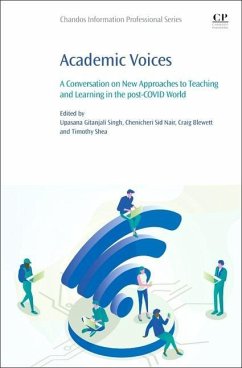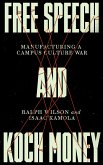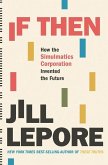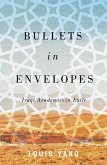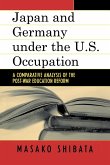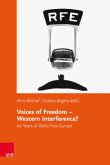Academic Voices
A Conversation on New Approaches to Teaching and Learning in the post-COVID World
Herausgegeben:Singh, Upasana Gitanjali; Nair, Chenicheri Sid; Blewett, Craig; Shea, Timothy
Academic Voices
A Conversation on New Approaches to Teaching and Learning in the post-COVID World
Herausgegeben:Singh, Upasana Gitanjali; Nair, Chenicheri Sid; Blewett, Craig; Shea, Timothy
- Broschiertes Buch
- Merkliste
- Auf die Merkliste
- Bewerten Bewerten
- Teilen
- Produkt teilen
- Produkterinnerung
- Produkterinnerung
Academia's Digital Voice: A Conversation on 21st Century Higher Education provides critical information on an area that needs particular attention given the rapid introduction and immersion into digital technologies that took place during the pandemic, including quality assurance and assessment. Sections discuss the rapid changes called into question as student mobility, pedagogical readiness of academics, technological readiness of institutions, student readiness to adopt online learning, the value of higher education, the value of distance learning, and the changing role of administration…mehr
Andere Kunden interessierten sich auch für
![Free Speech and Koch Money Free Speech and Koch Money]() Ralph WilsonFree Speech and Koch Money14,99 €
Ralph WilsonFree Speech and Koch Money14,99 €![If Then If Then]() Jill LeporeIf Then19,99 €
Jill LeporeIf Then19,99 €![Bullets in Envelopes Bullets in Envelopes]() Louis YakoBullets in Envelopes30,99 €
Louis YakoBullets in Envelopes30,99 €![Voices from the Grave Voices from the Grave]() Ed MoloneyVoices from the Grave21,99 €
Ed MoloneyVoices from the Grave21,99 €![Japan and Germany under the U.S. Occupation Japan and Germany under the U.S. Occupation]() Masako ShibataJapan and Germany under the U.S. Occupation56,99 €
Masako ShibataJapan and Germany under the U.S. Occupation56,99 €![Colonial Voices Colonial Voices]() Gerald MonsmanColonial Voices24,95 €
Gerald MonsmanColonial Voices24,95 €![Voices of Freedom - Western Interference? Voices of Freedom - Western Interference?]() Voices of Freedom - Western Interference?50,00 €
Voices of Freedom - Western Interference?50,00 €-
-
-
Academia's Digital Voice: A Conversation on 21st Century Higher Education provides critical information on an area that needs particular attention given the rapid introduction and immersion into digital technologies that took place during the pandemic, including quality assurance and assessment. Sections discuss the rapid changes called into question as student mobility, pedagogical readiness of academics, technological readiness of institutions, student readiness to adopt online learning, the value of higher education, the value of distance learning, and the changing role of administration and faculty were thrust upon institutions.
The unprecedented speed of international lockdowns caused by the pandemic necessitated HEIs to make rapid changes in both teaching and assessment approaches. The quality of these and sacrosanctity of the academic voice has long been the central tenet of higher education. While history is replete with challenges to this, the current, rapidshift to online education may represent the greatest threat and opportunity so far.
The unprecedented speed of international lockdowns caused by the pandemic necessitated HEIs to make rapid changes in both teaching and assessment approaches. The quality of these and sacrosanctity of the academic voice has long been the central tenet of higher education. While history is replete with challenges to this, the current, rapidshift to online education may represent the greatest threat and opportunity so far.
Produktdetails
- Produktdetails
- Verlag: Chandos Publishing / Elsevier Science & Technology
- Artikelnr. des Verlages: C2020-0-04518-4
- Seitenzahl: 526
- Erscheinungstermin: 5. April 2022
- Englisch
- Abmessung: 152mm x 231mm x 30mm
- Gewicht: 860g
- ISBN-13: 9780323911856
- ISBN-10: 0323911854
- Artikelnr.: 62605610
- Herstellerkennzeichnung
- Libri GmbH
- Europaallee 1
- 36244 Bad Hersfeld
- gpsr@libri.de
- Verlag: Chandos Publishing / Elsevier Science & Technology
- Artikelnr. des Verlages: C2020-0-04518-4
- Seitenzahl: 526
- Erscheinungstermin: 5. April 2022
- Englisch
- Abmessung: 152mm x 231mm x 30mm
- Gewicht: 860g
- ISBN-13: 9780323911856
- ISBN-10: 0323911854
- Artikelnr.: 62605610
- Herstellerkennzeichnung
- Libri GmbH
- Europaallee 1
- 36244 Bad Hersfeld
- gpsr@libri.de
Professor Upasana Singh is the Academic Leader and Associate Professor in Information Systems and Technology at the University of KwaZulu-Natal, Durban, and an Adjunct Senior Lecturer at the Victorian Institute of Technology, Australia. With a Ph.D. from the University of South Africa and over 15 years of teaching experience, she specializes in IT-related subjects and Educational Technologies. Professor Singh has an extensive publication record, including books, journal articles, and conference papers, contributing significantly to digital teaching, learning, and assessment. As Chair of the digiTAL2K conference, she promotes global collaboration in educational technologies. Her research, particularly during the pandemic, has been instrumental in guiding online learning transitions, with a focus on quality assurance and gender-specific models. She has received numerous accolades for her leadership and contributions to digital education, including the Distinguished Teachers Award and recognition from ASCILITE's Women in Academic Leadership initiative
Dr. Craig Blewett is an Associate Professor at the University of KwaZulu-Natal, South Africa; an internationally acclaimed speaker and the developer of the ACT approach to teaching with technology. He has numerous books, papers, and other publications on a range of technology-related topics during his over 20-year academic career.
Dr. Craig Blewett is an Associate Professor at the University of KwaZulu-Natal, South Africa; an internationally acclaimed speaker and the developer of the ACT approach to teaching with technology. He has numerous books, papers, and other publications on a range of technology-related topics during his over 20-year academic career.
1. Virtual exchange: Expanding access to global learning
2. A framework for distanced e-learning in digitally constrained communities using WhatsApp
3. Lightboard streaming technology for teaching and learning: Responding to student wellbeing and enhancing onlinelearning
4. Mobilising screencast technology and ipsative design to transform feedback practices
5. Instructional approaches to increase students' engagement in the new normal learning setting
6. Gamification as an engagement, learning and interaction strategy for distance education in Mozambique
7. Upping our game-Increasing online engagement through gamified e-learning
8. Participatory learning culture: From spectators to creators in online learning environments
9. Online STEM teaching of practical chemistry: Challenges and possibilities
10. Pandemic-proof teaching: Blended learning infrastructure to support pivot to online/hybrid pedagogy
11. Online teaching and learning of Hindustani classical vocal music: Resistance, challenges, and opportunities
12. Assessment in higher education during troubled times: The case of a South African arts module
13. COVID-19 and the move to online teaching in a developing country context: Why fundamental teaching and assessment principles still apply?
14. Application of trauma-informed teaching and learning principles in a blended learning environment
15. Student-centred learning, collaborative learning, and a pedagogy of care in an online foreign language teacher education course
16. Comparative reflections on the transition to online delivery in higher education during the COVID-19 pandemic
17. Skillsets and attributes for enhanced teaching-learning outcomes at higher educational institutions in disruptive times
18. COVID-19 consequences-Aligning learning outcomes with realigned teaching activities
19. Covid-19, community psychology and some thoughts on teachingand learning
20. HERDSA TATAL tales: Reflecting on academic growth as a Community for Practice
21. Rapidly orienting academic staff for emergency remote teaching: Responsive approaches for academic professional learning
22. Teaching adaptability in higher education institutions: A case study of a private Indian university
23. Faculty perspectives on Moodle migration during COVID-19: A view from the global South
24. Challenges and silver linings: Our reflections on delivering experiential learning online during Covid-19
25. Disruptions and delays: Lecturers' experiences of moving an information systems module online
26. Assessing the relationship between academic communities of practice and collegial learning: Case: Universit'e des Mascareignes
27. The use of eLearning by South African lecturers: Experiences during the COVID-19 pandemic
28. Intersections of the mental, social, economic, and physical burdens of COVID-19 on women in academia
29. A metabletic investigation on the impact of living, learning, and leading university reform in the pandemic shadow
30. Towards authentic online assessment in higher education: Lessons learnt during the COVID-19 period
31. The voices of online students in the quality assurance process
32. Resit exams in Australian higher education: Lessons from a novel COVID-19 assessment trial
33. Prevalence of online cheating during the COVID-19 pandemic
34. The 'futurist' voice of academia
35. Unbound education: Curriculum no longer confined by time and space
36. Meet Lisa: The robot who stole your job
37. Doctoral supervision: Let us dream about thesis defence!
38. The relevance of digital transformation in Africa in the wake of COVID-19: An uBuntu prospective
39. Resurgence or retrofit? A chance to humanise student teachers in crisis-ravaged Chile
2. A framework for distanced e-learning in digitally constrained communities using WhatsApp
3. Lightboard streaming technology for teaching and learning: Responding to student wellbeing and enhancing onlinelearning
4. Mobilising screencast technology and ipsative design to transform feedback practices
5. Instructional approaches to increase students' engagement in the new normal learning setting
6. Gamification as an engagement, learning and interaction strategy for distance education in Mozambique
7. Upping our game-Increasing online engagement through gamified e-learning
8. Participatory learning culture: From spectators to creators in online learning environments
9. Online STEM teaching of practical chemistry: Challenges and possibilities
10. Pandemic-proof teaching: Blended learning infrastructure to support pivot to online/hybrid pedagogy
11. Online teaching and learning of Hindustani classical vocal music: Resistance, challenges, and opportunities
12. Assessment in higher education during troubled times: The case of a South African arts module
13. COVID-19 and the move to online teaching in a developing country context: Why fundamental teaching and assessment principles still apply?
14. Application of trauma-informed teaching and learning principles in a blended learning environment
15. Student-centred learning, collaborative learning, and a pedagogy of care in an online foreign language teacher education course
16. Comparative reflections on the transition to online delivery in higher education during the COVID-19 pandemic
17. Skillsets and attributes for enhanced teaching-learning outcomes at higher educational institutions in disruptive times
18. COVID-19 consequences-Aligning learning outcomes with realigned teaching activities
19. Covid-19, community psychology and some thoughts on teachingand learning
20. HERDSA TATAL tales: Reflecting on academic growth as a Community for Practice
21. Rapidly orienting academic staff for emergency remote teaching: Responsive approaches for academic professional learning
22. Teaching adaptability in higher education institutions: A case study of a private Indian university
23. Faculty perspectives on Moodle migration during COVID-19: A view from the global South
24. Challenges and silver linings: Our reflections on delivering experiential learning online during Covid-19
25. Disruptions and delays: Lecturers' experiences of moving an information systems module online
26. Assessing the relationship between academic communities of practice and collegial learning: Case: Universit'e des Mascareignes
27. The use of eLearning by South African lecturers: Experiences during the COVID-19 pandemic
28. Intersections of the mental, social, economic, and physical burdens of COVID-19 on women in academia
29. A metabletic investigation on the impact of living, learning, and leading university reform in the pandemic shadow
30. Towards authentic online assessment in higher education: Lessons learnt during the COVID-19 period
31. The voices of online students in the quality assurance process
32. Resit exams in Australian higher education: Lessons from a novel COVID-19 assessment trial
33. Prevalence of online cheating during the COVID-19 pandemic
34. The 'futurist' voice of academia
35. Unbound education: Curriculum no longer confined by time and space
36. Meet Lisa: The robot who stole your job
37. Doctoral supervision: Let us dream about thesis defence!
38. The relevance of digital transformation in Africa in the wake of COVID-19: An uBuntu prospective
39. Resurgence or retrofit? A chance to humanise student teachers in crisis-ravaged Chile
1. Virtual exchange: Expanding access to global learning
2. A framework for distanced e-learning in digitally constrained communities using WhatsApp
3. Lightboard streaming technology for teaching and learning: Responding to student wellbeing and enhancing onlinelearning
4. Mobilising screencast technology and ipsative design to transform feedback practices
5. Instructional approaches to increase students' engagement in the new normal learning setting
6. Gamification as an engagement, learning and interaction strategy for distance education in Mozambique
7. Upping our game-Increasing online engagement through gamified e-learning
8. Participatory learning culture: From spectators to creators in online learning environments
9. Online STEM teaching of practical chemistry: Challenges and possibilities
10. Pandemic-proof teaching: Blended learning infrastructure to support pivot to online/hybrid pedagogy
11. Online teaching and learning of Hindustani classical vocal music: Resistance, challenges, and opportunities
12. Assessment in higher education during troubled times: The case of a South African arts module
13. COVID-19 and the move to online teaching in a developing country context: Why fundamental teaching and assessment principles still apply?
14. Application of trauma-informed teaching and learning principles in a blended learning environment
15. Student-centred learning, collaborative learning, and a pedagogy of care in an online foreign language teacher education course
16. Comparative reflections on the transition to online delivery in higher education during the COVID-19 pandemic
17. Skillsets and attributes for enhanced teaching-learning outcomes at higher educational institutions in disruptive times
18. COVID-19 consequences-Aligning learning outcomes with realigned teaching activities
19. Covid-19, community psychology and some thoughts on teachingand learning
20. HERDSA TATAL tales: Reflecting on academic growth as a Community for Practice
21. Rapidly orienting academic staff for emergency remote teaching: Responsive approaches for academic professional learning
22. Teaching adaptability in higher education institutions: A case study of a private Indian university
23. Faculty perspectives on Moodle migration during COVID-19: A view from the global South
24. Challenges and silver linings: Our reflections on delivering experiential learning online during Covid-19
25. Disruptions and delays: Lecturers' experiences of moving an information systems module online
26. Assessing the relationship between academic communities of practice and collegial learning: Case: Universit'e des Mascareignes
27. The use of eLearning by South African lecturers: Experiences during the COVID-19 pandemic
28. Intersections of the mental, social, economic, and physical burdens of COVID-19 on women in academia
29. A metabletic investigation on the impact of living, learning, and leading university reform in the pandemic shadow
30. Towards authentic online assessment in higher education: Lessons learnt during the COVID-19 period
31. The voices of online students in the quality assurance process
32. Resit exams in Australian higher education: Lessons from a novel COVID-19 assessment trial
33. Prevalence of online cheating during the COVID-19 pandemic
34. The 'futurist' voice of academia
35. Unbound education: Curriculum no longer confined by time and space
36. Meet Lisa: The robot who stole your job
37. Doctoral supervision: Let us dream about thesis defence!
38. The relevance of digital transformation in Africa in the wake of COVID-19: An uBuntu prospective
39. Resurgence or retrofit? A chance to humanise student teachers in crisis-ravaged Chile
2. A framework for distanced e-learning in digitally constrained communities using WhatsApp
3. Lightboard streaming technology for teaching and learning: Responding to student wellbeing and enhancing onlinelearning
4. Mobilising screencast technology and ipsative design to transform feedback practices
5. Instructional approaches to increase students' engagement in the new normal learning setting
6. Gamification as an engagement, learning and interaction strategy for distance education in Mozambique
7. Upping our game-Increasing online engagement through gamified e-learning
8. Participatory learning culture: From spectators to creators in online learning environments
9. Online STEM teaching of practical chemistry: Challenges and possibilities
10. Pandemic-proof teaching: Blended learning infrastructure to support pivot to online/hybrid pedagogy
11. Online teaching and learning of Hindustani classical vocal music: Resistance, challenges, and opportunities
12. Assessment in higher education during troubled times: The case of a South African arts module
13. COVID-19 and the move to online teaching in a developing country context: Why fundamental teaching and assessment principles still apply?
14. Application of trauma-informed teaching and learning principles in a blended learning environment
15. Student-centred learning, collaborative learning, and a pedagogy of care in an online foreign language teacher education course
16. Comparative reflections on the transition to online delivery in higher education during the COVID-19 pandemic
17. Skillsets and attributes for enhanced teaching-learning outcomes at higher educational institutions in disruptive times
18. COVID-19 consequences-Aligning learning outcomes with realigned teaching activities
19. Covid-19, community psychology and some thoughts on teachingand learning
20. HERDSA TATAL tales: Reflecting on academic growth as a Community for Practice
21. Rapidly orienting academic staff for emergency remote teaching: Responsive approaches for academic professional learning
22. Teaching adaptability in higher education institutions: A case study of a private Indian university
23. Faculty perspectives on Moodle migration during COVID-19: A view from the global South
24. Challenges and silver linings: Our reflections on delivering experiential learning online during Covid-19
25. Disruptions and delays: Lecturers' experiences of moving an information systems module online
26. Assessing the relationship between academic communities of practice and collegial learning: Case: Universit'e des Mascareignes
27. The use of eLearning by South African lecturers: Experiences during the COVID-19 pandemic
28. Intersections of the mental, social, economic, and physical burdens of COVID-19 on women in academia
29. A metabletic investigation on the impact of living, learning, and leading university reform in the pandemic shadow
30. Towards authentic online assessment in higher education: Lessons learnt during the COVID-19 period
31. The voices of online students in the quality assurance process
32. Resit exams in Australian higher education: Lessons from a novel COVID-19 assessment trial
33. Prevalence of online cheating during the COVID-19 pandemic
34. The 'futurist' voice of academia
35. Unbound education: Curriculum no longer confined by time and space
36. Meet Lisa: The robot who stole your job
37. Doctoral supervision: Let us dream about thesis defence!
38. The relevance of digital transformation in Africa in the wake of COVID-19: An uBuntu prospective
39. Resurgence or retrofit? A chance to humanise student teachers in crisis-ravaged Chile

